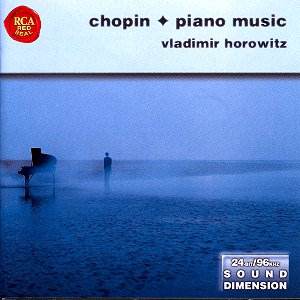Horowitz was in a mischievous mood indeed when he played
the Polonaise-fantaisie in a 1982 concert. There are many phrases which
have a speaking quality and an exquisite tenderness (in a rich-sounding
recording) which they have probably never had before or since. But all
sense of proportion seems to have left him, with the hands so uncoordinated
as to virtually reinvent the textures, single notes brought violently
into the limelight as though saying with a glint in his eye, "ah,
you didnít expect that, did you!". At times I hardly recognised
the piece, though Iíve studied it and played it in concert myself. Some
of his textures, his sonorities and his phrasing are so phenomenal as
to make any other pianist green with envy; yet all the same, were I
able myself to do all these things (or even one or two of them!), I
hope I would resist the temptation actually to do them, for great violence
is wrought to the overall line and structure of this noble work. Turn
to Horowitzís CBS recording of about ten years earlier (I have this
on an LP which doesnít give a precise date) and these whimsical features
are still present, but are not allowed to intrude on the overall sweep
of a performance which does infinitely greater service to Chopin himself.
There could be a case for preferring Rubinsteinís grand yet songful
simplicity in this work, but the Horowitz performance to remember is
certainly not this one.
However, op. 61 at least finds Horowitz strikingly
involved in every note he plays. The trouble with the G minor Ballade
is that he sounds as if he has flogged the old war-horse so often over
the years as to have lost interest in it. The gestures are all too automatic,
and here, also, there is an earlier CBS performance, live from the Carnegie
Hall in 1968, which is infinitely fresher and generally free of exaggerations.
I find it worrying that this compilation is being put
out, not in some "Legendary Recordings" series, aimed at a
public which will hopefully know how to separate the grain from the
chaff, but in a series which seems intended, to judge from the "Chopin
is for you"-style notes, for first-time buyers. Certainly they
will have a strange plunge from these 1982 aberrations to the "correct"
but also very fine 1957 Nocturne recordings (rather dry and shallow
in sound, but not at all bad).
It would seem that the 1982 performances were a diabolic
whim of the moment rather than evidence of the terminal decline of a
very great artist, for the remaining recent recordings contain some
very fine performances indeed of works which Horowitz had not perhaps
played quite so often. The Barcarolle is glorious in sound, and no other
performance I know is so pervaded by the lapping of the water and the
sunlight on the laguna as this one. The C sharp minor Study (Chopinís
great anticipation of Scriabin) is also notable for the independence
of its contrapuntal singing lines, but within the disciplined framework
of the pulsating chords, and the F minor Ballade, a late work which
has proved elusive to some of the greatest pianists, has a glorious
overall surge, leading to an overwhelming conclusion and with much poetic
detail on the way.
A comparison of the "Black-note" Study with
an earlier CBS alternative suggests this time that Horowitz never did
trouble to find the poetry in this piece, treating it on both occasions
as a straightforward Study only, but the Valse gets a performance full
of teasing timings which always threaten to go over the top but never
quite do.
For once Iím at a loss to know how to recommend this
overall. Itís not really for first-timers and BMG would have done better
to offer them a Rubinstein compilation though I do see that Rubinstein
compilations have entered so many households round the world that they
may be reaching saturation-point. Piano buffs are likely to have collected
all this in more comprehensive Horowitz Editions and the like. If you
are a piano buff and you havenít got these performances of the Barcarolle
and the 4th Ballade, then you should certainly get them without
delay.
Christopher Howell


